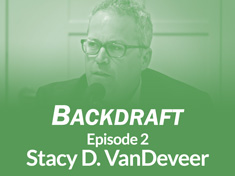-
Backdraft Episode #2: Stacy VanDeveer on the New Energy Economy and the Fate of Petro States
February 10, 2017 By Lauren Herzer Risi A “green economy,” an energy sector composed entirely of renewables, is the goal of many. But we haven’t thought out the full implications of that change, says Stacy VanDeveer, professor at the University of Massachusetts Boston, in this week’s “Backdraft” podcast.
A “green economy,” an energy sector composed entirely of renewables, is the goal of many. But we haven’t thought out the full implications of that change, says Stacy VanDeveer, professor at the University of Massachusetts Boston, in this week’s “Backdraft” podcast.A “green economy,” an energy sector composed entirely of renewables, is the goal of many. But we haven’t thought out the full implications of that change, says Stacy VanDeveer, professor at the University of Massachusetts Boston, in this week’s “Backdraft” podcast.
In the latest episode in our series on the peace and conflict consequences of climate change responses, VanDeveer discusses how cleaner energy can still be a dirty business and what de-carbonization could mean for petro states.
Meet the New Economy, Same as the Old Economy?
The promising growth of renewable energy – which includes wind, solar, and hydropower – is expected to continue, spurred by technological improvements and supportive policies in key markets.
However, warns VanDeveer, though these produce less carbon during generation, “the high-tech economy is not that different at the mining end of the stream than the old one.”
Clean energy still requires extensive mining and, in particular, large quantities of rare earth minerals. Extraction of rare earth minerals primarily takes place in vulnerable communities around the world, where people lack labor rights and are exposed to environmental hazards.
This has repercussions beyond the immediate impacts on mining communities. If you haven’t addressed inefficiencies and waste throughout the supply chain, you won’t see the expected reductions in carbon emissions, says VanDeveer. It can also undermine efforts to build democratic governance.
“Yes, there are millions of jobs…but they are not in the same communities”“The first thing,” says VanDeveer, “is to acknowledge that while we have one global climate change conversation, when people are actually dealing with energy issues – who has it, who doesn’t have it, how much it costs – those decisions are much more local and much more national.” India and South Africa are going to look different from the United States and Europe in their coal use, for example, because their needs and economies are different.
Understanding the energy needs of people at different levels of decision-making and in different contexts is important to developing climate policy that decreases emissions but also provides benefits to affected communities – or at a minimum, doesn’t introduce further stress.
VanDeveer suggests the best climate policies will involve more input from people directly affected by energy decisions and will be designed with their outcomes in mind. Yes, we want to see a reduction in carbon emissions, he says, but we also want people to have more economic opportunities and to benefit from stronger democracies.
A Shared Responsibility
VanDeveer also recommends speaking more openly about what climate and energy policies will mean for oil-dependent economies.
If oil sales decrease, there will be real consequences for petro states like Nigeria, Chad, Russia, and Saudi Arabia. “Many of these states have very poor governance, a lot of corruption, a lot of environmental hazards from the oil industry, and people in those places have not been allowed to have democratic articulation, they can’t get control of the negatives in the oil company,” says VanDeveer.
There’s a very real possibility that if the oil money dries up, these nations will be even less capable of delivering basic goods. After the collapse of oil prices in recent years, some African states slashed domestic spending on health care, for example. Such a collapse could contribute to instability, migration, even violent revolution.
“At the end of the day, that’s much of our money,” VanDeveer says. “That money is flowing from some countries to others, so we have some sort of shared responsibility for these very undemocratic and corrupt outcomes.”
Whether driven by government policy or market fundamentals, changes to the energy economy are not just an international concern, says VanDeveer. Already, shifts away from coal are affecting communities across the United States.
“If we haven’t thought about what happens to these people when the economy changes, we haven’t done them a service of good government and we haven’t been good citizens,” he says. “Yes, there are millions of jobs in the new energy economy, but they may not be in the same states, they are not in the same communities, they are not for people with the same skills.”
The “Backdraft” podcast series is hosted and co-produced by Lauren Herzer Risi and Sean Peoples, a freelance multimedia producer based in Washington, DC.
Friday Podcasts are also available for download on iTunes and Google Podcasts.
Topics: Africa, backdraft, Backdraft podcast, Chad, climate change, coal, conflict, democracy and governance, development, economics, energy, environment, environmental security, Europe, featured, foreign policy, Friday Podcasts, hydropower, international environmental governance, Middle East, minerals, mitigation, natural resources, Nigeria, oil, Russia, Saudi Arabia, security, solar, South Africa, U.S., wind
 A Publication of the Stimson Center.
A Publication of the Stimson Center.

 A “green economy,” an energy sector composed entirely of renewables, is the goal of many. But we haven’t thought out the full implications of that change, says Stacy VanDeveer, professor at the University of Massachusetts Boston, in this week’s “Backdraft” podcast.
A “green economy,” an energy sector composed entirely of renewables, is the goal of many. But we haven’t thought out the full implications of that change, says Stacy VanDeveer, professor at the University of Massachusetts Boston, in this week’s “Backdraft” podcast.

